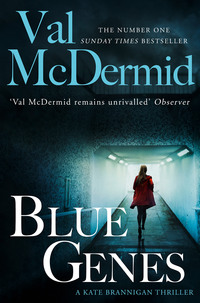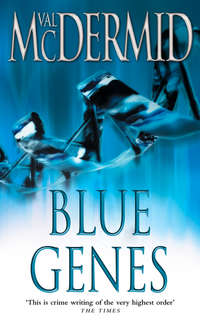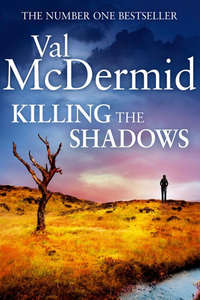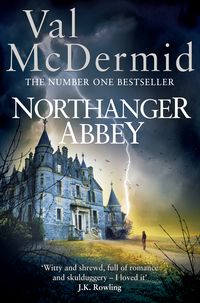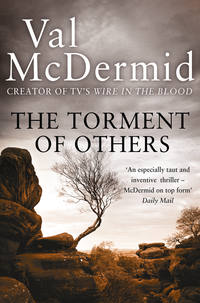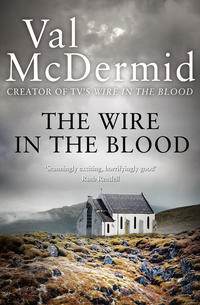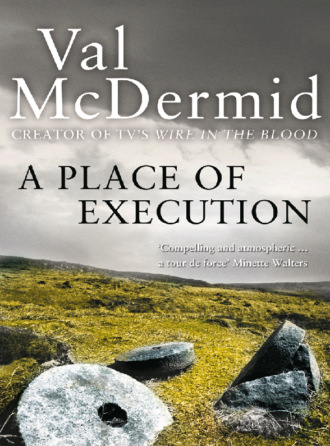
Полная версия
A Place of Execution
Two calls in the space of ten minutes had broken the routine peace of an evening in front of the TV with his wife Meg, the children bathed and in bed. It wasn’t that he hadn’t taken the first call seriously. When old Ma Lomas, the eyes and ears of Scardale, took the trouble to subject her arthritis to the biting cold by leaving the comfort of her cottage for the phone box on the village green, he had to pay attention. But he’d thought he could wait till eight o’clock and the end of the programme before he did anything about it. After all, Ma might be dressing up the reason for her call as concern over a missing schoolgirl, but Grundy wasn’t so sure it wasn’t just an excuse to stir things up for the lass’s mother. He’d heard the talk and knew there were a few in Scardale as thought Ruth Carter had been a bit quick to jump the broomstick with Philip Hawkin, even if he had been the first man to put roses in her cheeks since her Roy had died.
Then the phone had rung again, bringing a scowl to his wife’s face and dragging him out of his comfortable armchair into the chilly hall. This time, he couldn’t ignore the summons. Sergeant Lucas from Buxton knew about the missing girl, and he was on his way. As if it wasn’t bad enough having Buxton boots tramping all over his ground, he was bringing the Professor with him. It was the first time Grundy or any of his colleagues had ever had to work with somebody that had been to university, and he knew from the gossip on his occasional visits to the sub-division in Buxton that they were none of them comfortable with the idea. He hadn’t been slow to join the mutterings about the university of life being the best teacher for a copper. These graduates – you couldn’t send them out of a Saturday night on to Buxton marketplace. They’d never have seen a pub fight in all their born days, never mind know how to deal with one. As far as Grundy could make out, the only good thing that could be said about DI Bennett was that he could turn a handy bat at cricket. And that wasn’t reason enough for Grundy to be happy about him arriving on his patch to upset his carefully nurtured contacts.
With a sigh, he buttoned up his shirt collar. He pulled on his tunic jacket, straightened his cap on his head and picked up his overcoat. He stuck his head round the living room door, a conciliatory smile fastened nervously on his face. ‘I’ve to go to Scardale,’ he said.
‘Shh,’ his wife admonished him crossly. ‘It’s getting to the exciting bit.’
‘Alison Carter’s gone missing,’ he added, spitefully closing the living room door behind him and hurrying down the hall before she could react. And react she would, he knew only too well. A missing child in Scardale was far too close to home for Longnor not to feel a chill wind on its neck.

George Bennett followed Sergeant Lucas out to the yard where the cars were parked. He’d have far preferred to travel in his own car, a stylish black Ford Corsair as new as his promotion, but protocol demanded he climb into the passenger seat of the liveried Rover and let Lucas drive. As they turned south on the main road through the market square, George tried to stifle the prickle of excitement that had stirred in him when he had heard the words, ‘missing lass’. Chances were, as Lucas had rightly pointed out, that it would all come to nothing. More than ninety-five per cent of cases of children reported missing ended in reunion before bedtime, or at worst, before breakfast.
But sometimes, it was a different story. Sometimes, a missing child stayed missing long enough for the certainty to grow that he or she would never come home. Occasionally, that was from choice. More often, it was because the child was dead and the question for the police then became how long it would take them to find a body.
And sometimes, they seemed to vanish as cleanly as if the earth had opened up and gulped them down.
There had been two cases like that within the last six months, both of them less than thirty miles away from Scardale. George always made a careful note of bulletins from outside forces as well as other Derbyshire divisions, and he had paid particular attention to these two missing persons cases because they were just close enough that the children might fetch up on his patch. Dead or alive.
First had been Pauline Catherine Reade. Dark-haired and hazel-eyed, sixteen years old, a trainee confectioner from Gorton, Manchester. Slim build, about five feet tall, wearing a pink and gold dress and a pale-blue coat. Just before eight on Friday, 12th July, she had walked out of the terraced house where she lived with her parents and her younger brother to go to a twist dance. She was never seen again. There had been no trouble at home or at work. She had no boyfriend to fall out with. She had no money to run away with, even if she’d wanted to. The area had been extensively searched and three local reservoirs drained, all without a trace of Pauline. Manchester police had followed up every report of a sighting, but none had led them to the vanished girl.
The second missing child appeared to have nothing in common with Pauline Reade apart from the inexplicable, almost magical nature of his disappearance. John Kilbride, 12 years old, 4ft 10 ins tall with a slim build, dark-brown hair, blue eyes and a fresh complexion. He was wearing a grey check sports jacket, long grey flannel trousers, a white shirt and black, chisel-toed shoes. According to one of the Lancashire detectives George knew from cricket, he wasn’t a bright lad, but a pleasant and obliging one. John went to the cinema with some friends on Saturday afternoon, the day after Kennedy died in Dallas. Afterwards, he left them, saying he was going down to the marketplace in Ashton-under-Lyne, where he often earned threepence making tea for the stallholders. The last anyone saw of him, he was leaning against a salvage bin around half past five.
The resulting hunt had been given a last desperate boost only the day before when a local businessman had offered a £100 reward. But nothing appeared to have come of it. That same colleague had remarked to George only the previous Saturday at a police dance, that John Kilbride and Pauline Reade would have left more traces if they’d been abducted by little green men in a flying saucer.
And now a missing girl on his patch. He stared out of the window at the moonlit fields lining the Ashbourne road, their rough pasture crusted with hoarfrost, the dry-stone walls that separated them almost luminous in the silvery light. A thin cloud crossed the moon and in spite of his warm coat, George shivered at the thought of being without shelter on a night like this in so inhospitable a landscape.
Faintly disgusted with himself for allowing his eagerness for a big case to overwhelm the concern for the girl and her family that should have been all that was on his mind, George turned abruptly to Bob Lucas and said, ‘Tell me about Scardale.’ He took out his cigarettes and offered one to the sergeant, who shook his head.
‘I won’t, thanks, sir. I’m trying to cut down. Scardale’s what you might call the land that time forgot,’ he said. In the short spurt of light from George’s match, Lucas’s face looked grim.
‘How do you mean?’
‘It’s like the Middle Ages down there. There’s only one road in and out and it comes to a dead end by the telephone box on the village green. There’s the big house, the manor, which is where we’re headed. There’s about a dozen other cottages and the farm buildings. No pub, no shop, no post office. Mr Hawkin, he’s what you might call the squire. He owns every house in Scardale, plus the farm, plus all the land a mile in all directions. Everybody that lives there is his tenant and his employee. It’s like he owns them an’ all.’ The sergeant slowed to turn right off the main road on to the narrow lane that led up past the quarry. ‘There’s only three surnames in the place, I reckon. You’re either a Lomas, a Crowther or a Carter.’
Not, George noticed, a Hawkin. He filed the inconsistency away for later inspection. ‘Surely people must leave, to get married, to get work?’
‘Oh aye, people leave,’ Lucas said. ‘But they’re always Scardale through and through. They never lose it. And every generation, one or two people do marry out. It’s the only way to avoid wedding your cousins. But often as not, them as have married into Scardale come out a few years later looking for a divorce. Funny thing is, they always leave the kids behind them.’ He cast a quick glance at George, almost to see how he was taking it.
George inhaled his cigarette and kept his own counsel for a moment. He’d heard of places like this, he’d just never actually been in one. He couldn’t begin to imagine what it must be like to be part of a world so self-contained, so limited, where everything about your past, present and future must be information shared with an entire community. ‘It’s hard to believe a place like that could exist so close to the town. What is it? Seven miles?’
‘Eight,’ Lucas said. ‘It’s historical. Look at the pitch of these roads.’ He pointed up at the sharp left turn into the village of Earl Sterndale where the houses built by the quarry company to house their workers huddled along the hillside like a rugby scrum. ’Before we had cars with decent engines and proper tarmac roads, it could take you the best part of a day to get from Scardale to Buxton in the winter. That’s when the track wasn’t blocked with snowdrifts. Folk had to rely on their own. Some places around here, they just never got out of the habit.
‘Take this lass, Alison. Even with the school bus, it probably takes her the best part of an hour to get to and from school every day. The county have been trying to get parents to agree to sending children like her as boarders Monday to Friday, to save them the journey. But places like Scardale, they just flat refuse. They don’t see it as the county trying to help them. They think it’s the authorities trying to take their children off them. There’s no reasoning with them.’
The car swung through a series of sharp bends and began to climb a steep ridge, the engine straining as Lucas changed down through the gears. George opened the quarterlight and flicked the remains of his cigarette on to the verge. A draught of frosty air tinged with smoke from a coal fire caught at his throat and he hastily closed the window. ‘And yet Mrs Hawkin wasn’t slow to call us in.’
‘According to PC Swindells, she’d knocked every door in Scardale first, though,’ Lucas said drily. ‘Don’t take me wrong. It’s not that they’re hostile to the police. They’re just…not very forthcoming, that’s all. They’ll want Alison found. So they’ll put up with us.’
The car breasted the rise and began the long descent into the village of Longnor. The limestone buildings crouched like sleeping sheep, dirty white in the moonlight, with plumes of smoke rising from every chimney in sight. At the crossroads in the centre of the village, George could see the unmistakable outline of a uniformed officer, stamping his feet on the ground to keep them warm.
‘That’ll be Peter Grundy,’ Lucas said. ‘He could have waited indoors.’
‘Maybe he’s impatient to find out what’s happening. It is his patch, after all.’
Lucas grunted. ‘More likely his missus giving him earache about having to go out of an evening.’
He braked a little too hard and the car slewed into the kerb. PC Peter Grundy stooped to see who was in the passenger seat, then climbed into the back of the car. ‘Evening, Sarge,’ he said. ‘Sir,’ he added, inclining his head towards George. ‘I don’t like the sound of this at all.’
2
Wednesday, 11th December 1963. 8.26 p.m.
Before Sergeant Lucas could drive off, George Bennett held up one finger. ‘Scardale’s only two miles away, yes?’ Lucas nodded. ‘Before we get there, I want to know as much as possible about what we’re getting into. Can we give PC Grundy a couple of minutes to give us some more details?’
‘A minute or two can’t do any harm,’ Lucas said, easing the car back into neutral.
Bennett squirmed round in his seat so he could see at least the dim outline of the local man’s face. ‘So, PC Grundy, you don’t think we’re going to find Alison Hawkin sitting by the fire getting a tongue-lashing from her mother?’
‘It’s Carter, sir. Alison Carter. She’s not the squire’s daughter,’ Grundy said with the faint air of impatience of a man who sees a long night of explanations ahead of him.
‘Thank you,’ George said mildly. ‘You’ve saved me putting my foot in it over that at least. I’d appreciate it if you could give us a quick briefing on the family. Just so I have an idea what we’re dealing with.’ He held out his cigarettes to Grundy to defuse any idea the man might have that he was being condescended to.
With a quick glance at Bob Lucas, who nodded, Grundy slipped a smoke from the packet and fumbled in his overcoat pocket for a light.
‘I’ve told the inspector the set-up in Scardale,’ Lucas said as Grundy lit his cigarette. ‘About how the squire owns the village and all the land.’
‘Right,’ Grundy said through a swathe of smoke. ‘Well, until about a year ago, it was Hawkin’s uncle who owned Scardale. Old Mr Castleton. There’ve been Castletons in Scardale Manor as far back as parish records show. Any road, old William Castleton’s only son was killed in the war. Flew bombers, he did, but he got unlucky one night over Germany and the last anyone heard was he was missing believed killed in action. His parents had been a good age when young William were born, and there were no other children. So when Mr Castleton died, Scardale went to his sister’s son, this Philip Hawkin. A man that nobody in the place had cast eyes on since he was in short trousers.’
‘What do we know about him?’ Lucas asked.
‘His mother, the squire’s sister, she grew up here, but she married a wrong ’un when she wed Stan Hawkin. He were in the RAF back then, but that didn’t last long. He always claimed he’d taken the rap for one of his senior officers, but the long and short of it was they threw him out for selling tools out the back gate. Any road, the squire took it on himself to see Hawkin right, and he got him a job with an old pal of his, selling cars down south. From all accounts, he never got caught on the fiddle again, but I reckon a leopard never changes its spots, and that’s why the family stopped coming up for visits.’
‘So what about the son, Philip?’ George asked, trying to speed up the story.
Grundy shrugged, his bulk making the car rock. ‘He’s a good-looking beggar, I’ll say that for him. Plenty of charm and smarm, an’ all. The women like him. He’s always been all right wi’ me, but I still wouldn’t trust him to hold the dog while I went for a pee.’
‘And he married Alison Carter’s mother?’
‘I was just getting to that,’ Grundy said with slow dignity. ‘Ruth Carter had been a widow close on six years when Hawkin arrived from down south to take up his inheritance. According to what I’ve heard, he was right taken with Ruth from the off. She’s a fine-looking woman, it’s true, but it’s not every man who’d be willing to take on another man’s child. Mind you, from what I’ve heard, that were never a problem to him. He never let up on Ruth, though. And she wasn’t averse to it, either. He put a sparkle back in her eye and no mistake. They were wed three months after he first showed his face in Scardale. They made a handsome couple.’
‘A whirlwind romance, then?’ George said. ‘I bet that caused a bit of ill feeling, even in a place as tight-knit as Scardale.’
Grundy shrugged. ‘I’ve heard nowt of the sort,’ he said. George recognized a stone wall when he saw it. He’d clearly have to earn Grundy’s trust before the village bobby would hand over his hard-won local knowledge. That the knowledge was there, George didn’t doubt.
‘Right then, let’s head on into Scardale and see what’s what,’ he said. Lucas put the car in gear and drove through the village. At a ‘no through road’ sign, he took a sharp left off the main road. ‘Well signposted,’ George commented drily.
‘Anybody that needs to go to Scardale knows the road there, I reckon,’ Bob Lucas said as he concentrated on driving up a narrow track that seemed to double back on itself in a series of switchback rises and falls. The twin cones of the headlamps made only a slight impression on the darkness of the road, hemmed in as it was by high banks and uneven dry-stone walls that bulged and leaned at apparently impossible angles against the sky.
‘You said when you got in the car that you didn’t like the look of this, Grundy,’ George said. ‘Why’s that?’
‘She seems like a sensible lass, this Alison. I know who she is – she went to primary school in Longnor. I’ve got a niece was in the same class and they went on to the grammar school together. While I was waiting for you, I popped in and had a quick word with our Margaret. She reckons Alison were the same as usual today. They came home on the bus together, just like always. Alison were talking about stopping off in Buxton after school one night this week to buy some Christmas presents. Besides, she says, Alison’s not one for running. If there’s ever owt wrong, she faces it head on. So it looks like whatever’s happened to Alison, it’s likely not happened from choice.’
Grundy’s heavy words sat like a stone in George’s stomach. As if to mirror their ominous nature, the roadside walls disappeared, replaced by steep cliffs of limestone, the road weaving through the narrow defile in a route entirely dictated by topography. My God, George thought, it’s like a canyon in a Western. We should be wearing stetsons and riding mules, not sitting in a car.
‘Just round the next bend, Sergeant,’ Grundy said from behind, his breath bitter with tobacco.
Lucas slowed the car to a crawl, following the curve of an overhanging pinnacle of rock. Almost immediately, the road ahead was blocked by a heavy barred gate. George drew his breath in sharply. If he’d been driving, unaware of the obstacle, he’d have crashed, for sure. As Grundy jumped out and trotted to open the gate, George noticed several paint scrapes in a variety of colours along the rock walls on either side of the road. ‘They don’t exactly welcome strangers with open arms around here, do they?’
Lucas’s smile was grim. ‘They don’t have to. Beyond the gate, technically it’s a private road. It’s only in the last ten years that it’s been asphalted. Before that, nothing that wasn’t a tractor or a Land Rover got up or down the Scardale road.’ He eased the car forward, waiting on the far side of the gate for Grundy to close up and rejoin them.
They set off again. Within a hundred yards of the gate, the limestone cliffs fell back, sloping away on either side to form a distant horizon. Suddenly they’d emerged from gloom into full moonlight once more. Against the starry sky, it looked to George as if they’d emerged from the players’ tunnel into a vast stadium, at least a mile across, with an almost circular ring of steep hills in place of tiers of seats. The arena was no sports field, however. In the eerie light of the moon, George could see fields of rough pasture rising gently from the road that bisected the valley floor. Sheep huddled together against the walls, their breath brief puffs of steam in the freezing air. Darker patches revealed themselves as areas of coppiced woodland as they drove past. George had never seen the like. It was a secret world, hidden and separate.
Now he could see lights, feeble against the moon’s silver gleam, but strong enough to outline a straggle of buildings against the pale limestone reefs at the far end of the dale. ‘That’s Scardale,’ Grundy said needlessly from the back seat.
The conglomeration of stone soon resolved itself into distinct houses huddled round a scrubby circle of grass. A single standing stone leaned at an angle in the middle of the green, and a telephone box blazed scarlet at one side, the only vivid splash of colour in Scardale by moonlight. There looked to be about a dozen cottages, none identical, each separated from its neighbours by only a few yards. Most were showing lights behind their curtains. More than once, George caught a glimpse of hands making a gap for faces to peer through, but he refused to be drawn into a sideways look.
At the very back of the green was a sprawl of ill-assorted gables and windows that George assumed must be Scardale Manor. He wasn’t sure quite what he’d been expecting, but it wasn’t this glorified farmhouse that looked like it had been thrown together over several hundred years by people who’d had more need than taste. Before he could say anything, the front door opened and an oblong of yellow light spilled out on to the yard in front of it. Against the light a woman’s form was silhouetted.
As the car drew to a halt, the woman took a couple of impulsive steps towards them. Then a man appeared at her shoulder and put an arm round her. Together they waited while the police officers approached, George hanging back slightly to let Bob Lucas take the lead. He could use the time Lucas was taking for the introductions to note his first impressions of Alison Carter’s mother and stepfather.
Ruth Hawkin looked at least ten years older than his Anne, which would put her in her late thirties. He reckoned she was about five feet three, with the sturdy build of a woman used to hard work. Her mid-brown hair was pulled back in a ponytail, which emphasized the drawn look around grey-blue eyes that showed signs of recent weeping. Her skin looked weather-beaten but her pursed lips showed faint traces of lipstick in their cracks. She wore an obviously hand-knitted twin set in a blue heather mixture over a pleated grey tweed skirt. Her legs were encased in ribbed woollen stockings, her feet shod sensibly in ankle boots with a zip up the front. It was hard to square what he was seeing with Peter Grundy’s description of Ruth as a good-looking woman. George would not have looked twice at her in a bus queue except for her obvious distress, which showed in the tightness of her body, arms crossed defensively across her chest. He assumed it had also drained her attractiveness from her.
The man standing behind her seemed far more at ease. The hand that wasn’t lightly touching his wife’s shoulder was thrust casually into the pocket of a dark-brown cardigan with suede leather facings. He wore grey flannel trousers whose turn-ups flopped over well-worn leather slippers. Philip Hawkin hadn’t been out knocking on village doors with his wife, George noted.
Hawkin was as handsome as his wife was ordinary. A couple of inches under six feet, he had straight dark hair swept back from a widow’s peak, lightly brilliantined to hold it in place. His face reminded George of a shield, with a broad, square forehead tapering to a pointed chin. Straight brows over dark-brown eyes were like an heraldic device; a slender nose seemed to point to a mouth shaped so that it appeared always to be on the point of a smile.
All of this George itemized and filed away in his memory. Bob Lucas was still speaking. ‘So if we could come in and take some details, we can get a clearer picture of what’s happened.’ He paused expectantly.
Hawkin spoke for the first time, his voice unmistakably alien to the Derbyshire Peaks. ‘Of course, of course. Come inside, officers. I’m sure she’s going to turn up safe and well, but it doesn’t hurt to follow the procedures, does it?’ He dropped his hand to the small of Ruth’s back and steered her back into the house. She seemed numb, certainly incapable of taking any initiative. ‘I’m sorry you’ve been dragged out on such a cold night,’ Hawkin added smoothly as he crossed the room.
George followed Lucas and Grundy across the thresh-old and into a farmhouse kitchen. The floors were stone flagged, the walls rough stone brightened with a coat of white distemper that had discoloured unevenly, depending on its proximity to the wood-burning stove and the electric cooker. A dresser and several cupboards of differing heights painted hospital green ranged round the walls, and a pair of deep stone sinks were set under the windows that looked out towards the end of the dale. Another pair of windows gave a view of the village green, the phone box bright against the darkness. Various pans and kitchen implements hung from the black beams that crossed the room a few feet apart. It smelled of smoke, cabbage and animal fat.


